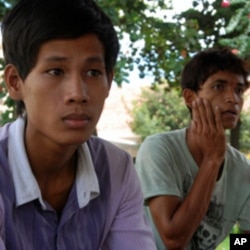The Cambodian government says more than 378 people died and hundreds more were injured in a stampede at the end of the annual Water Festival late Monday in Phnom Penh. On Tuesday afternoon, five hundred Buddhist monks chanted prayers in a ceremony for those who died, many of them on a bridge during the celebration.
Less than 24 hours after the tragedy, Cambodia's most serious loss of life in decades, the government established a committee to find out how so many died on what was meant to be one of the nation's most joyous occasions.
Most of the victims were young people in their teens and twenties. They were some of the estimated two million who had flocked to Phnom Penh for the annual Water Festival, which marks the end of the rainy season.
Most suffocated on the bridge, which thousands of people were using to leave Diamond Island, an entertainment area in the middle of the river. Others drowned after jumping from the bridge into the water.
Buot Panha, 19, was at the grounds of Phnom Penh's Calmette Hospital, where several hundred people were taken. He was waiting for two injured friends to be released.
He said shortly after 9:30 on Monday evening he ended up trapped with his friends in the middle of the bridge, fighting to breathe while terrified people struggled all around him.
Being tall saved his life, since he could stretch his neck to take in oxygen. Shorter people were unable to do that, he says, which may be why two-thirds of the victims were women.
He says this was his first time for the Water Festival in Phnom Penh, and he cannot believe something like this could happen. It is unbelievable that so many people died, he says.
He tried to help a woman who was trapped with two children near him. She was screaming for people to help. Being tall, Buot Panha grabbed one child and pushed him above the crowd to help him breathe.
But then some of the young men were told to jump off the bridge into the river to make room. So he handed back the child, squirmed his way to the edge, and jumped.
Some like Buot Panha were fortunate, jumping into the river below and swimming for the shore. But many simply could not move, and died where they lay.
He fears for the mother and two children.
The children probably died, he says, and the mother, too. She was yelling for people to help, but he could only help one. He was in the middle of the bridge and fortunate to be tall. But he says he could not move, unable to go forward or backward.
In the parking lot at Calmette Hospital in Phnom Penh, the authorities have erected two large tents.
In one, around 50 unidentified bodies are laid out under white sheets on mats. Police move silently between them, taking their fingerprints.
Nearby hundreds of relatives sit and wait, many weeping, as the authorities fill out forms to identify and release the bodies.
Buot Panha says his first Water Festival will be his last. He vows to never come back.
Related report by Brian Calvert





